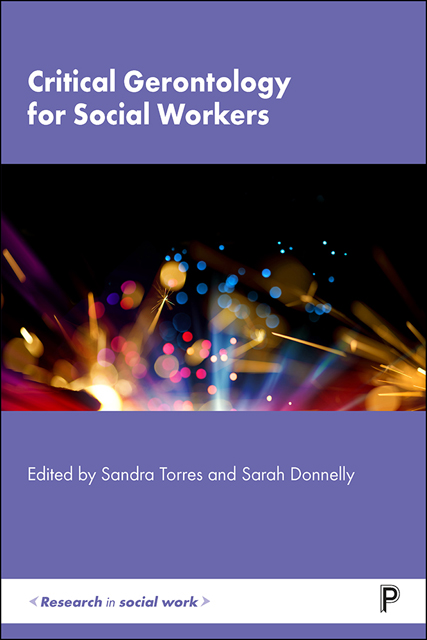Book contents
- Frontmatter
- Contents
- List of figures and tables
- Notes on contributors
- Acknowledgements
- Preface
- 1 Social work and critical gerontology: why the former needs the latter
- Part I Critical gerontology as guiding principles for social work with older people
- Part II Applying the critical gerontological lens to social work research, policy and practice
- Index
5 - Poverty and late-life homelessness
Published online by Cambridge University Press: 13 October 2022
- Frontmatter
- Contents
- List of figures and tables
- Notes on contributors
- Acknowledgements
- Preface
- 1 Social work and critical gerontology: why the former needs the latter
- Part I Critical gerontology as guiding principles for social work with older people
- Part II Applying the critical gerontological lens to social work research, policy and practice
- Index
Summary
Responses to poverty, inequality and marginalisation are at the heart of critical approaches to social work and ageing. However, the boundaries being drawn around gerontological social work in education and practice tend to focus on health and on professional issues of assessment and service delivery, with limited connections to either critical gerontology or structural social work. Analysing responses to poverty and late-life homelessness from a critical perspective can explain how these gaps emerged, and situate a more clearly articulated critical gerontological social work approach in research, education and practice.
Homelessness among older people is on the rise across international contexts such as the United States (US), Canada, Europe and Australia (Crane et al, 2005; Gaetz et al, 2016). Some estimates suggest that the numbers of older people who are homeless have grown by 20 per cent in the early 2000s (Crane and Joly, 2014). Although many factors contribute to this rise in late-life homelessness, many of the antecedents can be attributed to service provision, lifelong poverty and social crises such as trauma, family breakdown and mental health/substance challenges (Brown et al, 2016). Population ageing combined with concerns about growing inequalities between those ageing in poverty or disadvantage and those with more advantageous economic circumstances demands insights from critical social work approaches and active strategies for systematic change.
While there is a strong radical tradition in social work (see Fook, 1993; Leonard, 1997; Healy, 2000), and a related critical feminist focus on social care operating at the peripheries of social gerontology (see Sevenhuijsen, 2003; Baines, 2007; Armstrong and Braedley, 2013), these areas of research and scholarship have seldom been taken up directly in gerontological social work education and practice. Critical social work theories have evolved in child welfare, housing and immigration, but gerontological social work tends to be configured as a medically dominated and professionally defined field with little account for how systems of care and inequality shape the experiences of older people (see Hartford Program and Council for Social Work Education for a North American articulation of gerontological social work).
- Type
- Chapter
- Information
- Critical Gerontology for Social Workers , pp. 66 - 80Publisher: Bristol University PressPrint publication year: 2022

